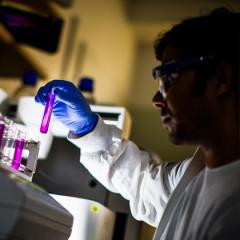Growing up, Dr Laura Leighton was always the curious kid. The pre-schooler who raised tadpoles in a backyard pool and asked big questions about how life worked. That early curiosity never left.
Today, Laura is a postdoctoral fellow at the Australian Institute for Bioengineering and Nanotechnology’s (AIBN) BASE facility – the largest manufacturer of mRNA in Australia - helping push the boundaries of mRNA research in the Cheetham Group.

“When I started my undergrad, one of the first subjects I took was molecular biology, and suddenly I was learning the answers to questions I’d had for years, like how the same genetic information can produce different kinds of cells just by switching genes on and off,” Laura said.
“Then once I got into a lab, I was hooked. There is nothing that beats the feeling of maybe being the first person to know something.”
That same sense of discovery is what drives her today, with Laura working to unlock the power of mRNA therapeutics and their potential to transform healthcare.
“There are lots of health conditions, like some genetic disorders and many cancers, that don't have good treatment options because the biological processes underlying the disease are happening inside of cells, where it's very hard to reach them with drugs,” she said.
“Because mRNA delivers the instructions to make a protein straight to the inside of a cell, it lets us target the underlying causes of disease with proteins we could never deliver otherwise.”
Under the supervision of Associate Professor Seth Cheetham, Laura is excited by the problem-solving side of her work, finding ways to make these powerful medicines smarter and safer.

Join The Network
Stay on top of our industry news and developments, events and opportunities, by joining The Network
“Though these challenges are big, I believe they are solvable, and I'm really excited to work on them every day.”
One of her proudest achievements is helping author a new protocol recently published in Nature Protocols, outlining AIBN’s method for making high-quality mRNA more efficiently.
“We wrote this protocol so other scientists can benefit from what we’ve learned,” Laura said.
“It’s already helping other labs create and test mRNAs faster and more cost-effectively. That’s important to me, sharing knowledge and supporting other researchers.”
Laura said she felt fortunate to be mentored by Associate Professor Cheetham, especially at this stage of her career.

“It’s incredibly valuable to have someone I can bounce ideas off who really understands my research area,” she said.
“Seth’s advice that every experiment should be publishable completely changed the way I think, and I now plan with impact in mind from the beginning.
“He’s also an excellent science communicator. I’m confident he could explain his research to a 5-year-old and this is a skill I’m developing with him too.”
She’s now paying that support forward, co-supervising two PhD students within the group.
“We share a lot of technical knowledge, from experimental design to incubation times, and all the things you only learn by doing,” she said.
“It’s a collaborative environment, and we’re always learning from each other.”
“There’s even a baking club, which is a great way to support one another and keep the team connected.”
So where does she see herself in five years’ time?
“If the stars align, I would love to be leading a small team of researchers working on RNA bioengineering to solve problems in healthcare or biomanufacturing.”
It’s clear that the curiosity which drove young Laura raising tadpoles is the same force driving her now, and with it, she aims to lead innovations that could improve lives.
Her journey from backyard experiments to world-class research is a testament to where passion and a place like AIBN can lead.
Want to learn more about this story or how you can partner with AIBN on ground-breaking research?
Contact us via email: communications@aibn.uq.edu.au
or phone: +61 414 984 324


